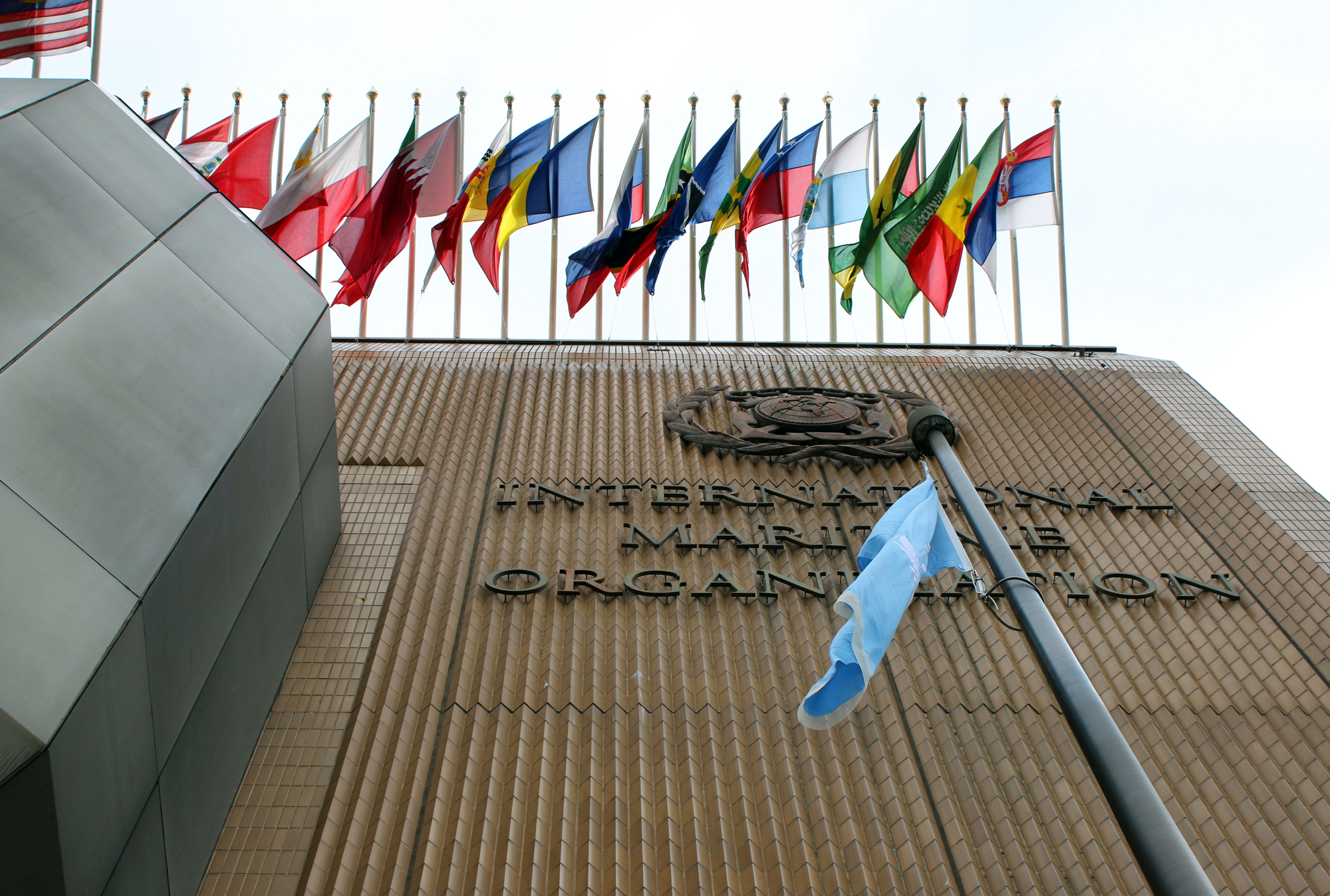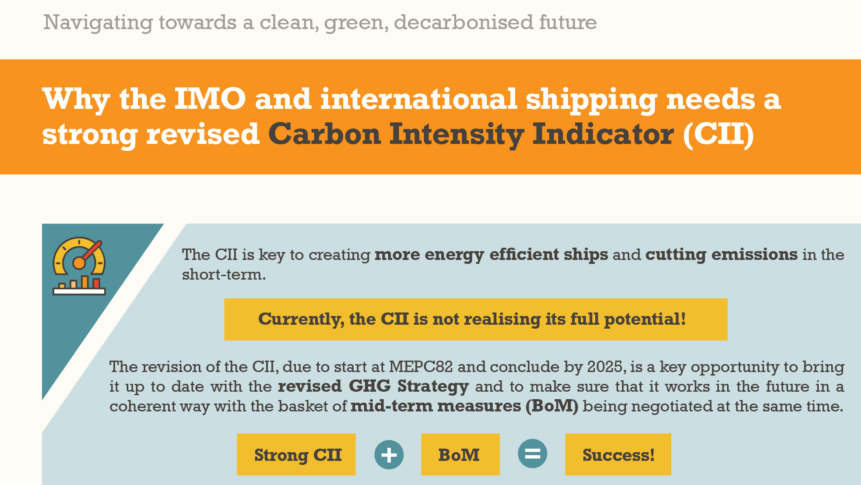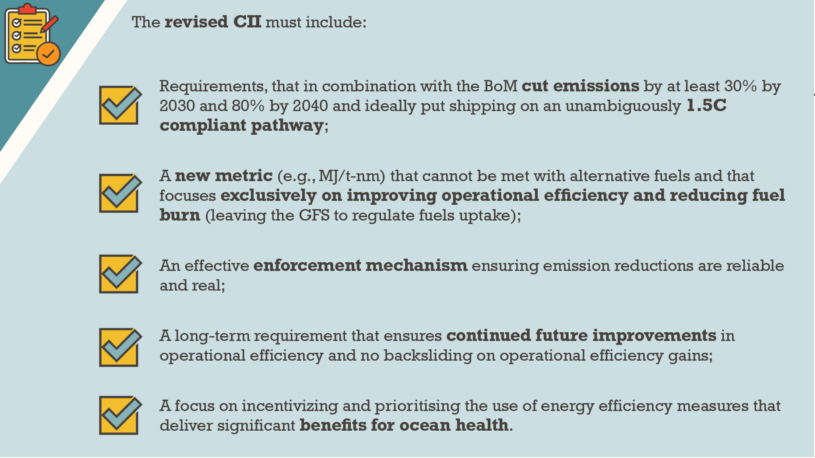UN at defining moment for 2030 and 2040 climate action on shipping

17 March 2023 – The International Maritime Organization (IMO) has a historic opportunity in the next three months to put the global shipping industry on an equitable, 1.5°C-aligned decarbonisation pathway. Governments must use the upcoming meeting of the Intersessional Working Group on Greenhouse Gases (ISWG-GHG-14) to support science-based climate targets for 2030 and 2040 that are vital for this transition.
Last year’s negotiations showed a major breakthrough on stepping up climate ambition for shipping. A clear majority of member states supported the adoption of a 2050 absolute zero-emission reduction target under the IMO’s revised climate strategy, bringing the sector closer than ever before to the Paris Agreement goals.
The IPCC climate science is clear, however, that preventing a global temperature rise beyond the 1.5°C climate-heating limit requires steep and immediate reduction in all greenhouse gas emissions across all sectors, including shipping.
IMO member states must listen to the climate-science, and urgently commit to halve climate pollution from ships by 2030 and to reach zero-emission by 2040. Given the disproportionate impacts of climate change felt in vulnerable and developing states already today, the IMO must also ensure this transition is just and equitable.
Exceeding the 1.5°C global-heating limit—even if temporarily—risks crossing triggering cascading and irreversible effects of climate change (‘tipping points’), such as ice sheet melt (especially in the Arctic), sea level rise, marine ecosystem loss, extreme weather events and socio-economic disruptions. Shipping and ports are particularly vulnerable to these adverse effects, and every year of inaction this decade will add an estimated $100 billion annually to the cost of shipping decarbonisation.This comes on top of the costs of the impacts of climate change on the industry, which is estimated to reach up to $7.1 billion annually by 2050 if countries fail to act.
Strong 2030 and 2040 targets will determine the IMO’s ambition across climate measures for the coming years, such as action on short-term pollutants (methane and black carbon), mandatory slow-steaming, a carbon levy of at least $100/tonne of greenhouse gas and a fuel standard.
John Maggs, Clean Shipping Coalition, said: “To trigger shipping’s great transition we need to be true to the science and set ambitious 1.5°C-compatible targets for 2030 and 2040. These will set the scene for urgent short-term emission cuts, unlock green investment, and stop the industry from wasting billions on false solutions like fossil LNG. If the IMO only agrees to zero by 2050 it will have failed, signalling years more of business as usual and making the decarbonisation of the sector harder, riskier and vastly more expensive than it needs to be.”
Lucy Gilliam, Seas At Risk, said: “The IMO’s working group talks take place as climate scientists issue yet another grave warning: act now on climate heating. The IPCC has been clear many times before on the risks to our civilization – especially to our supply networks, ships and coastal communities – and on what we have to do to rise to these challenges. This week at IMO we can put the waymarkers down and set the course for a climate safe, 1.5°C transition for the shipping sector.”
Sian Prior, Clean Arctic Alliance, said: “If the Arctic region is to have a sustainable future, there must be deep cuts to climate emissions from shipping, including short-lived climate forcers, such as black carbon and methane, before 2030. Measures to reduce black carbon emissions, one-fifth of shippings’ climate impact, can be introduced immediately – a switch to distillate fuels for ships operating north of 60 degrees North would lead to a rapid reduction in black carbon emissions. This is important not just for the Arctic environment, wildlife and Indigenous communities; what happens in the Arctic has consequences for the planet as a whole.”
Daniele Rao, Carbon Market Watch, said: “IMO member states must commit to ambitious targets for 2030 and 2040, to bring emissions down faster, earlier, and in a way that can benefit the most impacted by the climate crisis. To reach these targets, countries must support the $100 carbon levy proposed by the Marshall Islands and the Solomon Islands, which is an effective option on the table for reducing greenhouse gas emissions from ships.“
Jim Gamble, Pacific Environment, said: “The shipping industry must halve its emissions by 2030 and emit absolute zero greenhouse emissions by 2040 to help avoid the worst impacts of climate change. Extreme weather events, sea level rise, ice sheet melt and other climate-related challenges will adversely impact the shipping industry unless emissions are reined in. The path to decarbonization must start now at the IMO to make ports and shipping resilient, or the industry will face breakdowns in the global supply chain, increased operating costs, decreased demand and damages to ships and infrastructure.”
Background information:
The IMO is in the process of revising its existing climate strategy, which currently aims to only halve emissions from ships by 2050. At the last climate summit (MEPC 79) on 12-16 December, 32 countries were in favour of an absolute zero-emission goal by 2050. The negotiations are set to continue on 20-24 March (ISWG-GHG-14) and on 26-30 June at (ISWG-GHG-15), before concluding on 3-7 July (MEPC 80).
The CSC and several countries (the US, Canada, the UK, the Marshall Islands, the Solomon Islands, Tuvalu, Vanuatu, Kiribati, and Fiji) put forward concrete absolute emission reduction targets for 2030 and 2040 to IWSG-GHG-14.
Several influential IMO observers (the World Bank, Maersk Mc-Kinney Moller Centre, the Institute of Marine Engineering, Science and Technology and the United Nations Framework Convention on Climate Change (UNFCCC), have also previously called for deep emission cuts from ships before 2030.
This press release is issued by:
- John Maggs, Clean Shipping Coalition: jmaggs@seas-at-risk.org
- Delaine McCullough, Ocean Conservancy: dmccullough@oceanconservancy.org
- Lucy Gilliam, Seas At Risk: lgilliam@seas-at-risk.org
- Sian Prior, Clean Arctic Alliance: press@cleanarctic.org
- Jim Gamble, Pacific Environment: asantos@pacificenvironment.org
- Daniele Rao, Carbon Market Watch: daniele.rao@carbonmarketwatch.org


